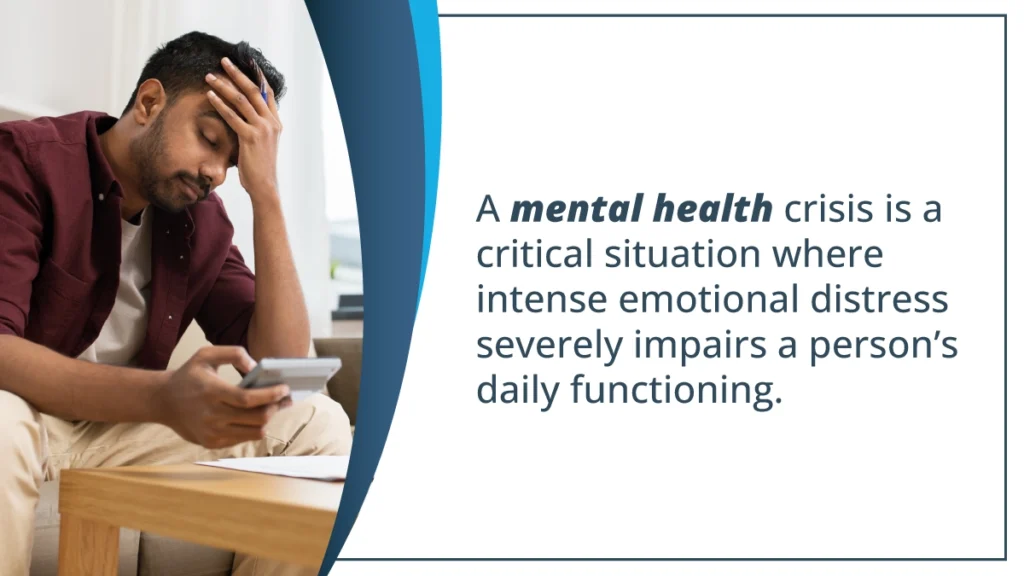Mental health is a growing concern that affects people of all ages. Many struggle silently, feeling overwhelmed by emotions they don’t fully understand. It’s crucial to recognize that mental health issues are real and deserve attention, just like physical health.
Addressing these challenges early can make a big difference in recovery. We can reduce stigma and encourage people to seek help by talking openly about these issues. Continue reading to explore the importance of addressing mental health crises.
Key Takeaways
Mental health is vital because it influences how we think, feel, and handle life’s challenges. Here’s what this article covers:
- A mental health crisis occurs when overwhelming stress or emotions severely disrupt a person’s ability to function.
- Various factors, such as trauma, stress, and untreated mental illness, contribute to a mental health crisis.
- Preventing a mental health crisis involves early intervention and addressing issues before they escalate.
The Haven Detox-New England offers comprehensive mental health treatment. Call us at (844) 933-4145 for more details.

Importance Of Addressing Mental Health Crisis
Addressing the mental health crisis is crucial for overall well-being. Mental health challenges can affect anyone, regardless of age or background. Ignoring these issues can lead to severe consequences like emotional distress and social isolation. Timely intervention and support can prevent worsening conditions and promote recovery.
Raising awareness about mental health helps reduce stigma, encouraging people to seek help. Many suffer in silence due to fear of judgment, which worsens their situation. By promoting open conversations, we create a supportive environment where people feel safe to share their struggles.
Investing in mental health services is essential for healthier communities. Access to proper care and resources can improve lives and lessen the drain on healthcare systems. Prioritizing mental health ensures everyone has the chance to live a fulfilling life.
Causes Of Mental Health Crisis
Mental health crises arise from various factors that impact individuals, families, and communities. These can lead to severe mental health conditions, substance use disorders, and self-harm behaviors. Understanding the causes helps recognize warning signs and address mental health emergencies before they escalate into severe mental illnesses or other problems.
Biological Factors
Biological factors contribute to mental health crises, including genetic predispositions, brain chemistry, and physical health issues. These factors can trigger or worsen mental disorders, leading to a mental breakdown. Recognizing biological influences helps in managing severe mental health conditions effectively, reducing the risk of substance abuse or severe mental illness.
Psychological Factors
Psychological factors, such as trauma, stress, and anxiety, can lead to mental health crises. These factors may cause abrupt changes in behavior or thought patterns, resulting in mental health issues. Addressing psychological causes is crucial to preventing mental breakdowns, severe mental health conditions, or substance use disorders in affected individuals.
Social And Environmental Factors
Social and environmental factors, like family dynamics, community support, and life events, significantly impact mental health. Negative influences may lead to severe mental illness, substance abuse, or other mental health problems. Strengthening positive environments and relationships helps prevent mental health emergencies and supports families and friends in crises.
Signs And Symptoms Of Mental Health Crisis
Recognizing signs of a mental health crisis is crucial. Symptoms may include thoughts of suicide, abrupt changes in behavior, or extreme mood swings. Family members and social workers should monitor any short-term distress that could lead to immediate danger, especially in people diagnosed with mental health conditions.
Emotional Symptoms
Emotional symptoms of a behavioral health crisis often include intense sadness or anxiety. Young people, adults, and children may experience hopelessness or extreme fear. These emotions can last hours, days, or weeks, signaling a public health crisis. Social workers play a central role in identifying and addressing these symptoms.
Physical Symptoms
Physical symptoms can also indicate a mental health crisis. These may involve sudden fatigue, headaches, or other unexplained pain. In addition, people might experience changes in appetite or sleep. Such symptoms are common in those facing a mental state crisis, including those with bipolar disorder or intellectual disabilities.
Behavioral Symptoms
Behavioral symptoms may involve an abrupt change in actions, such as substance use or withdrawal from others. In addition, risky behavior can escalate quickly, putting the person in immediate danger. Social workers must assess these signs, especially following a natural disaster or during a substance use crisis.
Impact Of Mental Health Crisis
The mental health crisis in the United States affects the general population’s well-being. Immediate support from medical centers is crucial. This crisis impacts individuals’ abilities to function and thrive. Addressing mental health is vital for the U.S. to improve overall health and productivity.
Impact On Individuals
Mental health issues reduce individuals’ abilities to manage daily tasks. Many in the U.S. struggle without immediate support, leading to worsening conditions. This impact affects their personal lives and careers. Prompt help from medical centers is essential for improving their quality of life.
Effects On Family Dynamics
Families across the United States face challenges when a loved one has mental health issues. They often fail to provide immediate support, which strains relationships. Medical centers can help relieve this burden. Addressing mental health within families improves overall well-being and strengthens family bonds.
Societal Impact
The mental health crisis in the U.S. affects the general population’s stability. It leads to decreased productivity and increased healthcare costs. Immediate support from medical centers is necessary to address these challenges. Strengthening mental health services benefits society by improving the population’s abilities and health.
Prevention Of Mental Health Crisis
Preventing a mental health crisis requires proactive mental health care. Mental health professionals play a vibrant role in providing mental health treatment. Organizations like the National Alliance on Mental Illness (NAMI) and the Mental Health Services Administration offer additional resources for the general population. Seeking professional help early can prevent crises.
Peer support is also crucial in mental health care. Connecting with others who have met the same challenges can make a difference. Mental health providers offer various options, including therapy and counseling, to manage mental health conditions. Reaching out for help can prevent issues from escalating.
If a mental health crisis arises, seek immediate help. Contact mental health professionals or use hotlines provided by organizations like NAMI. These services offer immediate support and additional resources. Early intervention by mental health providers can be life-saving.
Frequently Asked Questions (FAQ)
What is considered a mental health crisis?
A mental health crisis occurs when someone’s behavior or emotions reach a point where they need immediate help. It may involve intense hopelessness, uncontrollable thoughts, or actions that could harm themselves or others.
Professional intervention is important during a crisis to ensure safety and provide the necessary care. Seeking help promptly can prevent further harm and start the path to recovery.
What immediate steps should you take if you or someone you know is experiencing a mental health crisis?
If you or someone you know is in a mental health crisis, take immediate steps to ensure safety. Call a crisis hotline for urgent help. Stay with the person, offering calm support, and avoid leaving them alone.
Remove any dangerous objects nearby. Seek immediate help by contacting a mental health professional or visiting the nearest emergency room. These actions can make a vital difference in the situation.
Start Your Healing Journey With The Haven Detox-New England
If you are struggling with a mental health crisis, don’t wait for things to worsen. At The Haven Detox-New England, we provide various services to support people through challenging times.
Our facility provides mental health treatment through therapies and a holistic approach tailored to support comprehensive well-being. Our residential treatment program offers a safe and structured environment, allowing for intensive care and support around the clock.
Our team of mental health professionals is devoted to helping you find the right path to healing.
Call us today at (844) 933-4145 for support and take the first step toward a healthier, more fulfilling life.
Verify Insurance
Let’s get you or a loved one help with a few simple steps.




